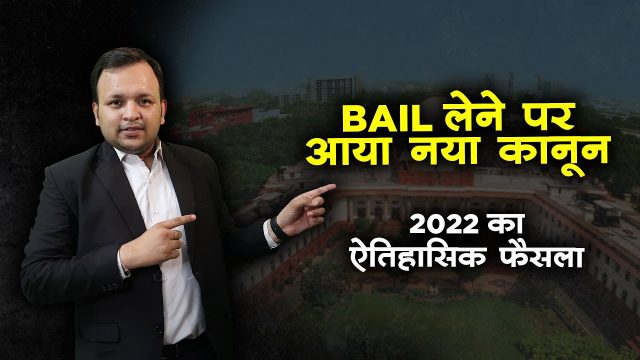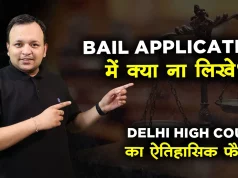When an F.I.R. against a person is registered, the police may arrest the person accused. To prevent any such arrest, the person can file an application for anticipatory bail under section 438 of Criminal Code Procedure (CrPC). In case the person is already arrested, you can file an application under section 439 of CrPC to get bail for the person arrested as soon as possible. In case of arrest, the most important thing to do is to get bail.
What is bail? What is the concept of bail? In what situation can a person get bail? This blog will answer all such questions regarding bail.
Concept of Bail
Bail means to secure your presence before the investigation authority or trial court. While deciding on the application of bail the court checks 2 things,
- Will the accused appear before the court for trial after granting bail or not?
- Whether the accused will destroy the evidence or try to scare the witness or not.
- The seriousness of the offense.
Types of offenses
There are two types of offenses: –
- Bailable offenses
Bailable offenses are those offenses where getting bail is a right of the accused. No judge or police officer can deny your bail if the offense that you are charged with is bailable.
- Non-bailable offenses
Non-bailable offenses are those offenses where bail is not a right of the accused but it depends on the discretion of the judge.
How to identify bailable and non-bailable offenses?
Check the act under which the offense has been applied to you. For example, under every section in IPC, it is mentioned whether the offence is bailable or non-bailable. If the offense is bailable then you will get bail easily but if the offense is nonbailable then you can either apply for anticipatory bail or normal bail depending upon whether the person is arrested or not.
Concept of Anticipatory Bail
If the person is not arrested but there are chances that he can be arrested then can file for anticipatory bail under section 438 CrPC. An anticipatory bail will be filled under a session court and not under a magistrate. It can only be filed if the person is not arrested. The court checks 3 things while deciding on an application for anticipatory bail: –
- Reputation. Will the arrest harm your reputation?
- Is the offense against you valid?
- Will you appear before the court or investigation authority when required?
After considering these factors the judge decides whether to give the anticipatory bail. If the bail is given then you can use the certified anticipatory bail if a police officer comes to arrest you.
Can You Get Anticipatory Bail Before Any F.I.R Is Registered Against You?
It is not necessary that an F.I.R. must be registered for you to file an anticipatory bail. If you feel like there will be an F.I.R. registered for which you can be arrested then you can file for anticipatory bail as a precautionary measure. You can get a certified copy of your F.I.R from the magistrate court or can find it on your state’s online portal. From there you can download your F.I.R. then you need to file a bail application in the session court.
Validity of an Anticipatory Bail
In a recent judgment on Sushila Aggrawal vs State (NCT of Delhi), 2020 the supreme court gave the judgment that anticipatory bail will be valid until the trial is over. That means your arrest depends solely on the decision oy your trial. If you are convicted then you will be arrested and if you set free then there will be no more requirement of bail. Although some of the acts and states have no provision for anticipatory bails like the Scheduled Caste and Scheduled Tribe (Prevention of Atrocities) Act, 1989.
What if you are Already arrested?
If you are already arrested then you need to file for bail under section 437 of CrPC in magistrate court. Generally, the plea for bail is dismissed by magistrates. Then you need to get the certified order of dismissed bail and file for bail in session court. Bail in session court is filed through section 439 of CrPC. You need to present the certified copy of the order dismissing the plea for bail, a copy of F.I.R, and any else relevant document.
If your plea is arrested in session court then you can approach the high court under section 439 of CrPC. It is important to first go through session court before filling for a plea in the high court. Sometimes the court may deny bail before the filing of a chargesheet for the sake of registering the evidence and witness. In such a situation the court may allow your bail plea after filling of the charge sheet. If the high court also rejects the bail plea, then you can approach the supreme court.
Landmark Judgement of Supreme Court
In Krishna Kumar vs the State of Haryana and another (2022), the supreme court of India noted that once the lower court rejects the bail, the accused cannot file for bail again for a particular time period like3 months or 6 months. In this case, as soon as the trial court convicted the accused, the accused filed for an appeal in a higher court along with an application for Suspension of Sentence (SOS) Application. Punjab and Haryana High Court rejected the SOS application and barred him from applying SOS for the next 3 years. The accused challenged this order of Punjab and Haryana high court in the supreme court. Supreme court said that the accepting or rejecting bail plea depends from case to case but a court cannot deny a person his right to bail. The court cannot stop a person from filling SOS. If a court needs to curtail the right to bail then it needs to done after appropriate consideration. You can file as many bails as you want. If one application is rejected then you can file it again. But you make sure that the reason the earlier bail was rejected is gone after the completion of chargesheet.
If the accused files for a bail application after being convicted, the application is called as Suspension of Sentence (SOS). This application Is filed under section 389 of CrPC.
Conclusion
Bail is a rule and jail is an exception. Supreme court of India will allow bail as long as it is possible/ Unless the offence is serious or there are threats regarding the safety of witnesses or the presence of the accused in the court bail will be granted. Earlier generally the bail lea used to be rejected but now the trend is changing. In lower courts like the trial court, session courts, and magistrate bail pleas used to be generally dismissed. But now times are changing and courts are in favor of granting bail.
Feel free to connect with us to better understand legal concepts!
If still doubts persist, consult legal experts at












